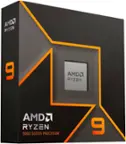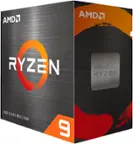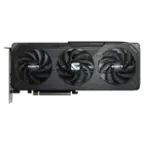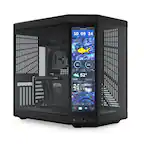
AMD - Ryzen 7 9700X 8-Core - 16-Thread 3.8 GHz (5.5 GHz Max Boost) Socket AM5 65W Unlocked Desktop Processor - Silver
AMD - Ryzen 7 9700X 8-Core - 16-Thread 3.8 GHz (5.5 GHz Max Boost) Socket AM5 65W Unlocked Desktop Processor - Silver
More Buying Options
Related Item
Specifications
- Processor SocketSocket AM5 (LGA 1718)PCI Express VersionPCI Express 5.0CPU Base Clock Frequency3.8 gigahertzCPU Boost Clock Frequency5.5 gigahertzNumber of CPU Cores8-coreNumber of CPU Threads16
- Key Specs
- Processor Socket: Socket AM5 (LGA 1718) (Type of pin configuration that connects a CPU to a computer’s motherboard.)
- PCI Express Version: PCI Express 5.0
- CPU Base Clock Frequency: 3.8 gigahertz (Actual central processing unit (CPU) speed may vary by device configuration and design. The average rate at which the processor is able to execute tasks under normal operating conditions as asserted by the manufacturer.)
- CPU Boost Clock Frequency: 5.5 gigahertz (Actual central processing unit (CPU) speed may vary by device configuration and design. The maximum rate at which the processor is able to execute tasks, typically only used for a short period of time as needed. This rate may temporarily boost the processor's performance, but may result in overheating, shutdown, or damage to equipment if sustained.)
- Number of CPU Cores: 8-core (A core, or "brain" of a CPU, allows it to receive and execute instructions. Each core can work independently or together to perform parallel operations.)
- Number of CPU Threads: 16 (Generally, the more threads, the faster and more responsive the operating system.)
- Unlocked Processor: true
- Memory Type Supported: DDR5
- L1 Cache: 512 megabytes (Cache memory, also called CPU memory, is random-access memory (RAM) that a computer microprocessor can access more quickly than it can access regular RAM. This memory is typically integrated directly with the CPU chip or placed on a separate chip that has a separate bus interconnect with the CPU.)
- L2 Cache: 8 megabytes (Cache memory, also called CPU memory, is random-access memory (RAM) that a computer microprocessor can access more quickly than it can access regular RAM. This memory is typically integrated directly with the CPU chip or placed on a separate chip that has a separate bus interconnect with the CPU.)
- L3 Cache: 32 megabytes (Cache memory, also called CPU memory, is random-access memory (RAM) that a computer microprocessor can access more quickly than it can access regular RAM. This memory is typically integrated directly with the CPU chip or placed on a separate chip that has a separate bus interconnect with the CPU.)
- Processor Base Power: 65 watts
- Integrated Graphics: true (Device has a built-in graphics processing unit.)
- Integrated Graphics Processor: AMD Radeon (This is responsible for displaying image content and decoding/encoding video content in programs and games.)
- Processor Generation/Series: 9000 Series
- General
- Brand: AMD
- Model Number: 100-100001404WOF
- Product Name: Ryzen 7 9700X 8-Core - 16-Thread 3.8 GHz (5.5 GHz Max Boost) Socket AM5 65W Unlocked Desktop Processor
- Color: Silver
- Processor Model Number: 9700X
- Processor Collection: Ryzen 7
- Processor Generation/Series: 9000 Series
- Year of Release: 2024
- Compatibility
- Processor Socket: Socket AM5 (LGA 1718) (Type of pin configuration that connects a CPU to a computer’s motherboard.)
- PCI Express Configuration: PCIe Gen 5 x1
- PCI Express Lanes (Total): 28
- PCI Express Version: PCI Express 5.0
- Processor Instruction Set: 64-bit
- Performance
- CPU Base Clock Frequency: 3.8 gigahertz (Actual central processing unit (CPU) speed may vary by device configuration and design. The average rate at which the processor is able to execute tasks under normal operating conditions as asserted by the manufacturer.)
- CPU Boost Clock Frequency: 5.5 gigahertz (Actual central processing unit (CPU) speed may vary by device configuration and design. The maximum rate at which the processor is able to execute tasks, typically only used for a short period of time as needed. This rate may temporarily boost the processor's performance, but may result in overheating, shutdown, or damage to equipment if sustained.)
- Number of CPU Cores: 8-core (A core, or "brain" of a CPU, allows it to receive and execute instructions. Each core can work independently or together to perform parallel operations.)
- Number of CPU Threads: 16 (Generally, the more threads, the faster and more responsive the operating system.)
- Unlocked Processor: true
- Hard Drive Accelerator: None (A module integrated (or added) into a PC to improve performance speed. By acting as a high-speed cache, an accelerator speeds up access times to the hard drive, which results in faster web browsing, improved gaming experience, and overall more responsiveness.)
- Memory
- Maximum Memory Supported: 192 gigabytes
- Memory Type Supported: DDR5
- Number of Memory Channels Supported: 2
- Cache Level: L1, L2, L3 (The cache stores data that the CPU needs to access quickly in order to complete tasks. Each level is ranked according to priority of access; Level 1 (L1) cache stores data that the CPU needs to access first. L1 cache is also the fastest but holds the least amount of data, with each following level decreasing in speed but increasing in capacity.)
- L1 Cache: 512 megabytes (Cache memory, also called CPU memory, is random-access memory (RAM) that a computer microprocessor can access more quickly than it can access regular RAM. This memory is typically integrated directly with the CPU chip or placed on a separate chip that has a separate bus interconnect with the CPU.)
- L2 Cache: 8 megabytes (Cache memory, also called CPU memory, is random-access memory (RAM) that a computer microprocessor can access more quickly than it can access regular RAM. This memory is typically integrated directly with the CPU chip or placed on a separate chip that has a separate bus interconnect with the CPU.)
- L3 Cache: 32 megabytes (Cache memory, also called CPU memory, is random-access memory (RAM) that a computer microprocessor can access more quickly than it can access regular RAM. This memory is typically integrated directly with the CPU chip or placed on a separate chip that has a separate bus interconnect with the CPU.)
- Features
- Processor Type: Desktop
- Thermal Solution: Not included (The kind of cooling system built into the CPU.)
- RAID Support: RAID 0, RAID 1, RAID 5 (A Redundant Array of Independent Disks (RAID) includes a collection of separate disks that your computer recognizes as one disk unit. Each configuration offers a different level of mirroring, striping and read/write speeds.)
- Power
- Processor Base Power: 65 watts
- Processor Boost Power: 88 watts
- Graphics
- Integrated Graphics: true (Device has a built-in graphics processing unit.)
- Integrated Graphics Processor: AMD Radeon (This is responsible for displaying image content and decoding/encoding video content in programs and games.)
- GPU Base Clock Frequency: 0.4 gigahertz (The minimum rate at which the graphics controller is guaranteed to operate.)
- GPU Boost Clock Frequency: 2.2 gigahertz (The maximum ideal rate at which the graphics controller is able to operate, typically only for a short period of time.)
- Number of GPU Cores: 2
- Warranty
- Warranty - Parts: 3 year limited
- Warranty - Labor: 3 Year Limited Warranty
- Other
- UPC: 730143315593
Performance Gaming. Ultimate content creator AI Platform. AMD X870/X870E Chipset.
Q: What is the base clock frequency of the processor?
A: The CPU base clock frequency is 3.8 gigahertz.
Q: What is the PCI Express version supported by the processor?
A: The PCI Express version supported by the processor is PCI Express 5.0.
Q: How many cores does the processor have?
A: The processor has 8 cores.
Q: What is the maximum memory supported by the processor?
A: The maximum memory supported is 192 gigabytes.
Compare similar products

Performance Gaming. Ultimate content creator AI Platform. AMD X870/X870E Chipset.
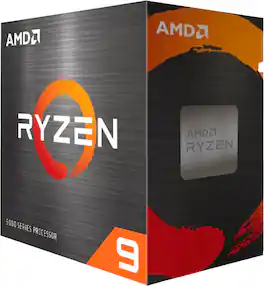
High-end Performance for Gamers and Creators AMD. Ryzen 5000XT Series processors boost your rig to a new level of performance. Power up and let the dominance begin with the AMD Ryzen 5000XT Series processors, built to bring home the victory.

Boosted by AMD's advanced "Zen 5" architecture and 4nm technology, you'll feel unmatched power in every moment of high-performance gaming. AMD Ryzen 7 9800X3D processors are built with exclusive AMD 3D V-cache technology. Designed for the AM5 platform, enabled with the fastest DDR5 memory speeds, and equipped with PCIe 5.0 for incredible bandwidth.

The dominant 8-core gaming desktop processor, whatever the setting, whatever the resolution, lead your team to victory with the top 8-core AMD gaming processor.
| Pros for AMD - Ryzen 7 9700X 8-Core - 16-Thread 3.8 GHz (5.5 GHz Max Boost) Socket AM5 65W Unlocked Desktop Processor - Silver | |||
|---|---|---|---|
| Processor Speed, Performance, Temperature, Installation Ease, RAM | Overall Performance, CPU Speed | Processor Speed, Gaming Performance, Heat Dissipation, Frame Rate, Installation | There were no pros for this product— |
| Cons for AMD - Ryzen 7 9700X 8-Core - 16-Thread 3.8 GHz (5.5 GHz Max Boost) Socket AM5 65W Unlocked Desktop Processor - Silver | |||
| There were no cons for this product— | There were no cons for this product— | Core Count | There were no cons for this product— |
Specs
Reviews
Customers are saying
Customers express satisfaction with the Ryzen 7 9700X processor's performance, citing it as the best value for the money. Users are impressed with its speed and have found the installation process to be easy. Additionally, some customers have noted the surprisingly cool operating temperatures and compatibility with RAM.
Customer Images
The vast majority of our reviews come from verified purchases. Reviews from customers may include My Best Buy members, employees, and Tech Insider Network members (as tagged). Select reviewers may receive discounted products, promotional considerations or entries into drawings for honest, helpful reviews.
- Rated 5 out of 5 stars
7800 XT Build — Fast, Cool & Extremely Smooth
I upgraded to the AMD Ryzen 7 9700X for my new build, and it has been phenomenal. I paired it with a B650 Eagle AX motherboard, 32GB of DDR5‑6000, a 2TB NVMe SSD, and a Ryzen‑friendly Corsair 240mm AIO inside a Corsair 4000D case. The CPU performs flawlessly in this setup. Gaming with my RX 7800 XT feels incredibly smooth. Frame pacing is consistent, load times are nearly instant, and the CPU never feels like it’s bottlenecking my GPU even in CPU‑heavy titles. Temperatures stay surprisingly low for the performance you get; even under full load, the 9700X runs cool and quiet with my AIO. For everyday use, multitasking is effortless. Whether I’m running VMs, working on school projects, browsing with tons of tabs, or gaming + streaming, the 9700X handles everything with zero slowdowns. Power efficiency is a huge bonus — the chip delivers high-end performance without running hot or pulling crazy watts. If you're building an AM5 system and want something powerful, efficient, and future‑proof, the Ryzen 7 9700X hits the sweet spot. Easily one of the best upgrades I've made.
Gage Posted
- Rated 5 out of 5 stars
Good gaming CPU for people with lesser budget
This is a good CPU for those who cannot afford the 9800X3D and whose primary purpose is gaming. It runs very cool (even in the 105W TDP mode, covered by warranty). To get the most out of this CPU, you should try to improve your infinity fabric and memory performance. It's faster than the 14900K in most games.
Kimukatsu Posted
- Rated 3 out of 5 stars
Not much improved from 7700X, wait for 9800X3D
Unlike the mobile products introduced at the same time with the Zen 5 architecture, which feature heterogeneous big and small cores, updated integrated GPU architecture, and integrated NPU among other flashy features, the new Ryzen 9000 desktop series does not have major architectural changes compared to the previous generation. Instead, it achieves higher frequencies and improved performance through microarchitectural refinements and new manufacturing processes, while also optimizing heat control and power efficiency within the existing framework of core count and expandability. In terms of performance, the single-core performance this time unsurprisingly surpasses Intel’s 13th/14th generation Core processors, which are its competitors. The advantage further amplifies in environments that can efficiently utilize the AVX-512 instruction set. In the gaming scenarios we tested, the Ryzen 7 9700X, even with its default 65W TDP configuration, showed sufficient performance release. For games where the bottleneck is not heavily dependent on memory and cache, its performance is almost on par with the Core i7-14700K, although the latter consumes significantly more power and generates more heat. However, the Ryzen 7 9700X, with only eight cores, falls short in rendering and encoding scenarios that can fully utilize multiple cores. Even when the Ryzen 7 9700X is pushed to a TDP of 105W or higher, thus achieving an average performance boost of around 8% and a maximum of about 15% compared to the default 65W setting in these scenarios, it still cannot match the performance of the Core i7-14700K, which houses 8P (performance) cores and 12E (efficiency) cores and has had its default performance restrained. In this domain, the gap between the two products is such that they could hardly be considered direct competitors. In terms of heat control, this generation also shows noticeable improvements. Even when switching to higher PBO/TDP settings, the temperature limit is often not the first to be hit in many full-core, fully open scenarios. This gives users more flexibility in building systems with limited cooling conditions or manually optimizing fan speed control curves. In conclusion, the strength of the Ryzen 7 9700X lies in its commendable gaming performance and excellent power efficiency based on it. Its weaknesses are in multi-core performance and games sensitive to memory/cache performance. For these shortcomings, AMD plans to address them with the upcoming 12 and 16-core Ryzen 9 9900X/9950X and the “X3D” series with 3D V-Cache. Although the Intel Core i7-14700K remains stronger in absolute performance and versatility, its recent quality issues have caused many potential users to reconsider, thus providing more market space for the entire Ryzen 9000 series, including the Ryzen 7 9700X.
Privater Posted




